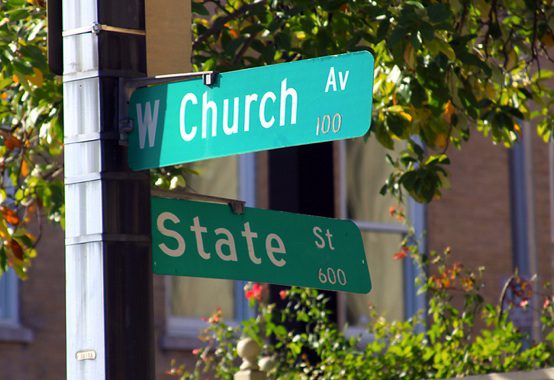Religion’s Fight for Criminal Justice

“Redemption and second chances, a fitting topic for Lent.”
With those words, Donna Brazile introduced the second morning panel of last week’s Bipartisan Summit on Criminal Justice Reform. They were emblematic of a recurring theme throughout the day: the invocation of religion. This was not a specifically religious event, rather a gathering of congressmen, governors, and nonprofits working for criminal justice reform. Nevertheless, the summit commenced with a prayer delivered to a packed auditorium of bowed heads, and none of the speakers shied away from mentioning their faith’s influence on their political opinions. Several even quoted from such sources as the Torah and the Bible in their remarks on the legislative fight for improved criminal justice processes. The summit proved to be a refreshing change of pace from the usual political interactions within the Beltway, not only because of its bipartisan nature, but also because it was such a clear demonstration of how religion and the state were designed to interact in the public square at the time of America’s founding.
Although the majority of the Founding Fathers were not particularly religious personally, they were keenly aware of how important religion was for a properly functioning republic. Virtue was considered to be a critical bulwark against corruptions that could destroy the new nation and put an early end to the American experiment. George Washington, in his famed Farewell Address, averred that “Of all the dispositions and habits which lead to political prosperity, religion and morality are indispensable supports.”
The Founders realized the necessity of providing a forum for religion in the public square while also accommodating the American aversion to an established religion. The clear answer was then to allow citizens to not only hold whichever beliefs they chose, but to permit them to voice those beliefs, allowing religion to prosper and infuse the mores of the citizenry.
The dynamic relationship between church and government envisaged by the Founders was visibly at play at the summit last week. In a political age distinguished by gridlock and partisanship, it was often noted, such comity between right and left is almost unheard of. Yet that is just what ardent liberals and steadfast conservatives were able to accomplish, drawing on some of the most influential voices on both sides of the political aisle.
Conservative activist Pat Nolan, who is a signatory of the Right on Crime Campaign along with Newt Gringrich, attributed this bipartisanship to the various faith traditions of U.S. politicians. Religion had shaped their consciences to view every human being as having inherent dignity, a belief that subsequently demanded that they strive for justice and compassion for all people, even those charged with a crime. Sen. Cory Booker (D-NJ) and Gingrich both echoed this sentiment when they spoke together on an opening panel. It is hard to imagine many situations which would see these two men not only chatting amicably, but sharing the same opinion. However, that is precisely what occurred last week, and both men credited their respective faith backgrounds for driving them to seek reform together.
The crusade for criminal justice reform is the ideal prototype of a legislative movement with religious underpinnings. One need look no further than the bipartisan bill backed by Booker along with Sen. Rand Paul (R-KY), titled the “Redeem Act,” to see the positive influence still wielded by religion within the government. The rhetoric used in the bill, and by Senator Booker when he discussed it at the summit, is heavily laced with references to “forgiveness” and “redemption” and a moral imperative to reconcile inmates with society. Nolan, when asked how it was that this movement could be so bipartisan in nature, stated without hesitation that when the aisle was too broad to cross, faith became a uniting factor that brought all sides together. Where political arguments had failed, religious intonations succeeded.
Senator Booker even went so far as to say that politicians must stand together on this issue “if we want to be a nation of light and hope, a shining city on the hill.” Many of the representatives from the nonprofit sector, the majority of whom had been imprisoned themselves at some point, also unabashedly cited their faith as the central impetus behind their rehabilitation and activism. Their words were not met with scorn or derision but with shouts of “Hallelujah” and “Amen” from an audience who, despite having signed up to attend a political conference, not a religious event, seemed perfectly willing to accept that it was faith that inspired these men and women’s zeal.
Religion is rarely cited as a uniting factor in politics. Indeed, even as they enshrined freedom of religion within the Constitution, the Founding Fathers were well aware that factions would no doubt arise and potentially threaten the stability of the Republic. Nevertheless, rather than attempting to stifle religious disagreement through law, they sought to provide the correct forum within which to incorporate disputes. Their advocacy for a robust and inclusive public square was critical not only to the fledgling republic, but to the uniquely American understanding of the relationship between religion and the state.
We have frequently stripped the public square of any hint of faith out of fear of causing offense, or setting off waves of rancor like those centered around the state of Indiana this week. However, last week’s summit proved that religion may in fact be the one force capable of overcoming the partisan divides that too frequently overwhelm our nation’s leaders. Driven forward by their consciences, which have been duly shaped by their own faith traditions, policymakers can continue to find some common concept of universal goods that transcend party lines.
In this way, religion will play the role in governance that our Founders intended, as the proverbial moral compass that guides and informs the state and citizens alike.
Kelly Thomas is an editorial assistant at The American Conservative.
Comments